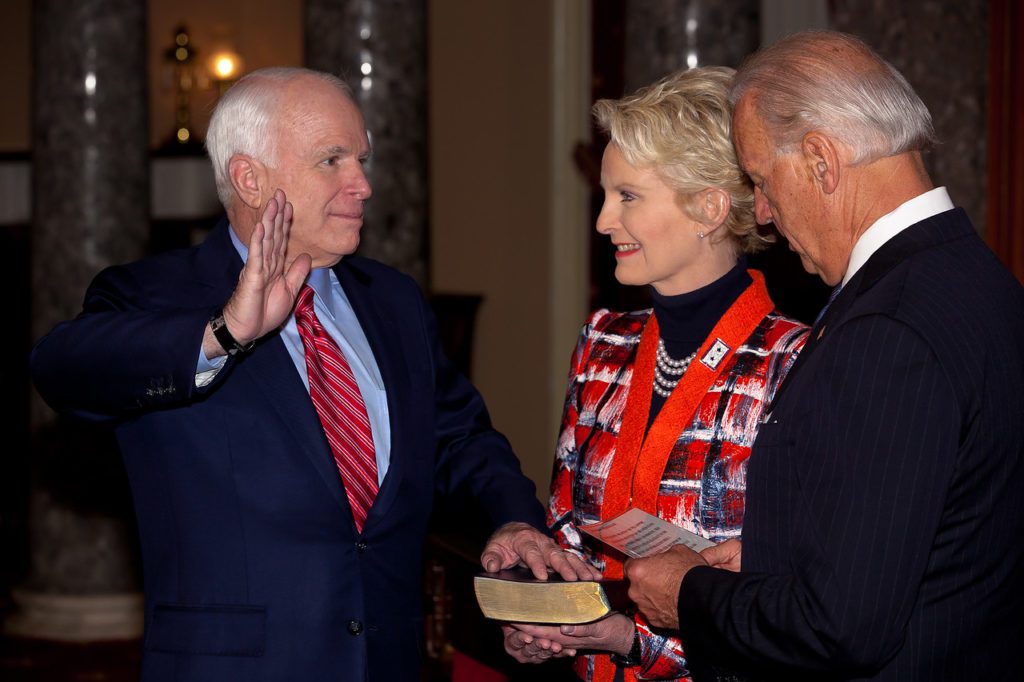Sen. John McCain, Gone Too Soon at 81
By • August 27, 2018 0 856

We often say, when a person of some or considerable distinction leaves the earthly bounds, that they have gone too soon, that they are still wanted and needed, that their absence from the life they led and lived will be felt by those left behind.
John McCain, the six-time senator from Arizona, died too soon. John McCain, the plainspoken politician, who ran for president twice and honorably lost both races, died too soon. John McCain, father, husband, family man and a visible presence in our national life, died too soon.
For anybody who longs to see people of deeply felt and held convictions and principles as a part of and a leader of our political landscape, John McCain is gone too soon.
John McCain, the last bigger-than-life figure in the United States Senate, passed too soon. For politicians, and those who aspire to high and middling offices both, who recognize that bipartisanship is a necessity, a longing and perhaps the only real tool to address national issues like immigration, our standing in the world and the differences among ourselves, the absence of John McCain will be felt deeply.
For those Americans who think character, honesty, an ability to appreciate humor — especially self-deprecating humor — and a willingness to admit mistakes and move forward with boundless buoyancy and optimism matter, John McCain will be missed.
This is not meant to be a political statement, but the expression of a fact that his death is a loss not only to his family and friends but to the nation.
This is not a political statement about right and left, conservative or liberal. It is rather identifying just how huge an American life John McCain lived, how it was crammed with experience, with taking positions not always popular with his supporters, how the experience included surviving torture and pain after being captured in North Vietnam and eventually returning with honor.
We will be hard put to see and hear his like again.
He was, like most of us, and like many politicians, a flawed but ambitious man who looked forward to the future as a time and place where we could prosper, create abundance and work together, bringing others with us. He was at times controversial in his choices, and sometimes did indeed choose party over country, but regretted and admitted those choices.
You could see his life in the pictures — the handsome, much more dark-haired Navy man and hero, a boisterous soul, sometimes reckless. He loved where he lived, which was in the Western expanses of Arizona, a state abundant in space, sky and possibilities, a reminder of the country’s westward expansion.
His presidential bids were odd in their course. He first challenged George W. Bush, putting up a spirited battle before succumbing. He took on Democratic nominee Barack Obama, a race in which he refused to succumb to demagoguery over the “birther” issue, defending his opponent as an honorable man and American.
He liked the description of maverick. He did not always do the politically correct thing, but you could always count on him to do the right thing, even if it was not necessarily the popular thing within his own party.
This was never better illustrated then in the debate over the 2010 Affordable Care Act. He joined Majority Leader Mitch McConnell to vote for legislation to start debate essentially over its survival. In the end, it was McCain who held the fate of the bill. McCain, who had already been diagnosed with brain cancer, in dramatic fashion, voted thumbs down on McConnell’s bill.
He loved the Senate, the old Senate of hands across the aisle and enduring friendships among senators of either party.
He made mistakes in both presidential bids, but he also admitted and recognized the mistakes. He faced people directly, whether on television or in person on the campaign trail. He was a vivid personality, a white-haired, almost Roman-style senator.
When he announced his illness, he worked as often as he could and as hard as he could. When the announcement came on Friday, Aug. 24, that medical care was being discontinued, it was news of the worst sort, that the end was near. No one quite expected that it would come as quickly as it did, the following day.
While national and world leaders and family members and Arizonians and regular folks and Americans spoke in the language of heartfelt tributes, no such language came from the president himself. Instead, the Trump White House tweeted what seemed to many like a perfunctory condolence message.
The message was a sign of the cool relations between the president and McCain. Donald Trump refused to acknowledge that John McCain was a genuine hero. “I don’t like people who get taken prisoner,” he had said famously in the past. Nothing much changed since; today, Aug. 27, the White House raised the American flag, which had been at half staff, to full staff.
It’s also a measure of McCain’s bipartisan inclinations that former presidents George W. Bush and Barack Obama, the men who had prevented him from reaching the highest office in the land were asked to deliver eulogies at his funeral. (To date, President Trump has not been invited.)
John McCain had all the qualities that might have inspired us and our political life moving forward: humor, the experience of suffering, a heroic nature, principles and honor, the ability to make lasting friends and a natural optimism about American virtues and the nation’s future. We lost him too soon, as we move into the jaws of the endless political cycle leading to what are sure to be contentious midterm elections.

